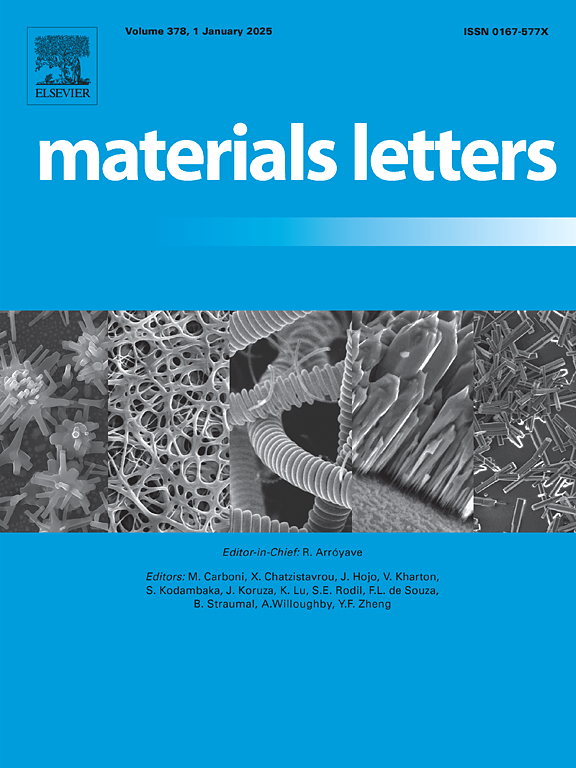Combining nanocrystalline NiCo with MOFs-derived carbon fibers skeleton: A dual confinement strategy to efficient electrocatalysts for oxygen evolution reaction
IF 2.7
4区 材料科学
Q3 MATERIALS SCIENCE, MULTIDISCIPLINARY
引用次数: 0
Abstract
A dual-confinement strategy was developed to design efficient electrocatalysts for oxygen evolution reaction (OER). NiCo alloy nanoparticles (NPs) were synthesized and embedded in N-doped carbon fibers (NCF) by electrospinning and carbonization techniques. Dual effects of size confinement by the metal–organic frameworks (MOFs) derived carbon skeleton companied with spatial confinement by polyacrylonitrile (PAN) derived carbon fibers (CFs) for the NiCo NPs were executed to improve the electrocatalytic activity. In an alkaline solution, the prepared NiCo-C@CF exhibits significant advantages over the commercial RuO2 catalyst i.e., a 61 mV lower overpotential of 363 mV under 50 mA cm−2, and excellent durability of 87.5 % current density retention after 60 h of continuous OER polarization.
将纳米晶镍钴与源自 MOFs 的碳纤维骨架相结合:实现氧进化反应高效电催化剂的双重限制策略
为设计氧气进化反应(OER)的高效电催化剂,研究人员开发了一种双重强化策略。通过电纺丝和碳化技术合成了镍钴合金纳米颗粒(NPs),并将其嵌入掺杂氮的碳纤维(NCF)中。金属有机框架(MOFs)衍生的碳骨架对镍钴合金纳米粒子的尺寸限制和聚丙烯腈(PAN)衍生的碳纤维(CFs)对镍钴合金纳米粒子的空间限制产生了双重效应,从而提高了镍钴合金纳米粒子的电催化活性。在碱性溶液中,制备的 NiCo-C@CF 与商用 RuO2 催化剂相比具有显著的优势,即在 50 mA cm-2 条件下,过电位低 61 mV,仅为 363 mV;在连续 OER 极化 60 小时后,电流密度保持率为 87.5%,具有极佳的耐久性。
本文章由计算机程序翻译,如有差异,请以英文原文为准。
求助全文
约1分钟内获得全文
求助全文
来源期刊

Materials Letters
工程技术-材料科学:综合
CiteScore
5.60
自引率
3.30%
发文量
1948
审稿时长
50 days
期刊介绍:
Materials Letters has an open access mirror journal Materials Letters: X, sharing the same aims and scope, editorial team, submission system and rigorous peer review.
Materials Letters is dedicated to publishing novel, cutting edge reports of broad interest to the materials community. The journal provides a forum for materials scientists and engineers, physicists, and chemists to rapidly communicate on the most important topics in the field of materials.
Contributions include, but are not limited to, a variety of topics such as:
• Materials - Metals and alloys, amorphous solids, ceramics, composites, polymers, semiconductors
• Applications - Structural, opto-electronic, magnetic, medical, MEMS, sensors, smart
• Characterization - Analytical, microscopy, scanning probes, nanoscopic, optical, electrical, magnetic, acoustic, spectroscopic, diffraction
• Novel Materials - Micro and nanostructures (nanowires, nanotubes, nanoparticles), nanocomposites, thin films, superlattices, quantum dots.
• Processing - Crystal growth, thin film processing, sol-gel processing, mechanical processing, assembly, nanocrystalline processing.
• Properties - Mechanical, magnetic, optical, electrical, ferroelectric, thermal, interfacial, transport, thermodynamic
• Synthesis - Quenching, solid state, solidification, solution synthesis, vapor deposition, high pressure, explosive
 求助内容:
求助内容: 应助结果提醒方式:
应助结果提醒方式:


